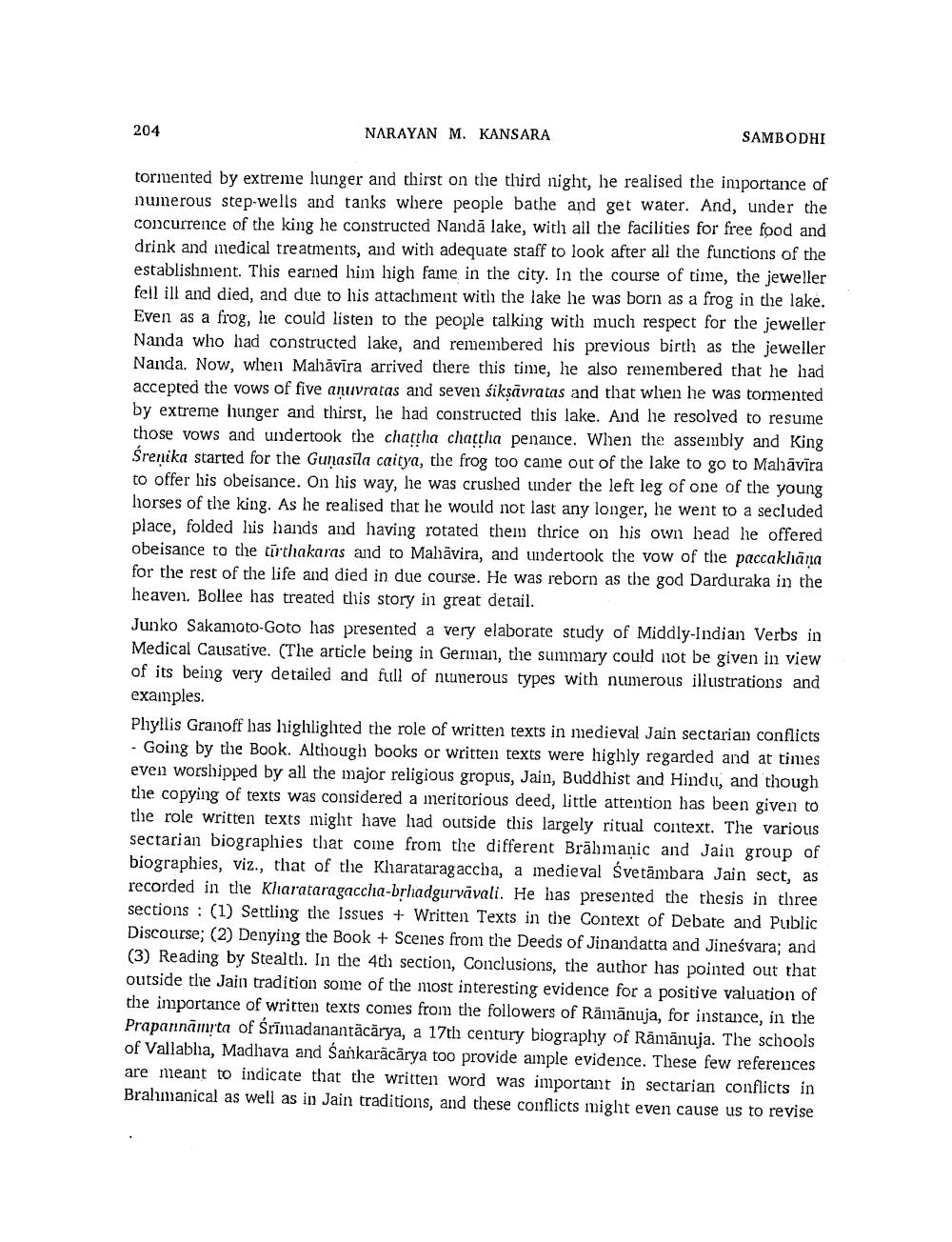________________
204
NARAYAN M. KANSARA
SAMBODHI
tormented by extreme hunger and thirst on the third night, he realised the importance of numerous step-wells and tanks where people bathe and get water. And, under the concurrence of the king he constructed Nandā lake, with all the facilities for free food and drink and medical treatments, and with adequate staff to look after all the functions of the establishment. This earned him high fame in the city. In the course of time, the jeweller fell ill and died, and due to his attachment with the lake he was born as a frog in the lake. Even as a frog, he could listen to the people talking with much respect for the jeweller Nanda who had constructed lake, and remembered his previous birth as the jeweller Nanda. Now, wlien Mahāvīra arrived there this time, he also remembered that he had accepted the vows of five anuvratas and seven sikşāvratas and that when he was tormented by extreme hunger and thirst, he had constructed this lake. And he resolved to resume those vows and undertook the chattha chattha penance. When the assembly and King Srenika started for the Gurasīla caitya, the frog too came out of the lake to go to Mahāvīra to offer his obeisance. On his way, he was crushed under the left leg of one of the young horses of the king. As he realised that he would not last any longer, he went to a secluded place, folded his hands and having rotated them thrice on his own head he offered obeisance to the tarthakaras and to Malāvira, and undertook the vow of the paccaklāna for the rest of the life and died in due course. He was reborn as the god Darduraka in the heaven. Bollee has treated this story in great detail. Junko Sakamoto-Goto has presented a very elaborate study of Middly-Indian Verbs in Medical Causative. (The article being in German, the summary could not be given in view of its being very detailed and full of numerous types with numerous illustrations and examples. Phyllis Granoff has highlighted the role of written texts in medieval Jain sectarian conflicts - Going by the Book. Although books or written texts were highly regarded and at times even worshipped by all the major religious gropus, Jain, Buddhist and Hindu, and though the copying of texts was considered a meritorious deed, little attention has been given to the role written texts might have had outside this largely ritual context. The various sectarian biographies that come from the different Brāhmanic and Jain group of biographies, viz., that of the Kharataragaccha, a medieval Svetämbara Jain sect, as recorded in the Kharataragaccha-brhadgurvāvali. He has presented the thesis in three sections: (1) Settling the issues + Written Texts in the context of Debate and Public Discourse; (2) Denying the Book + Scenes from the Deeds of Jinandatta and Jineśvara; and (3) Reading by Stealth. In the 4th section, Conclusions, the author has pointed out that outside the Jain tradition some of the most interesting evidence for a positive valuation of the importance of written texts comes from the followers of Rämānuja, for instance, in the Prapannāmrta of Srimadanantäcārya, a 17th century biography of Rāmānuja. The schools of Vallablia, Madhava and Sankarācārya too provide ample evidence. These few references are meant to indicate that the written word was important in sectarian conflicts in Brahmanical as well as in Jain traditions, and these conflicts might even cause us to revise




